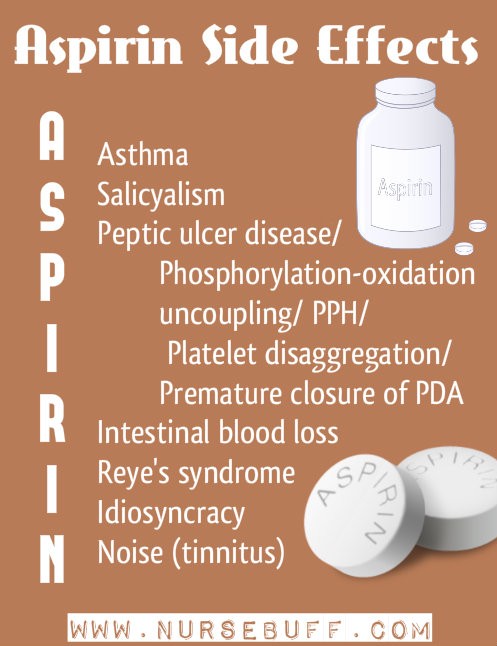
Contents
aspirin rectal
Aspirin (acetylsalicylic acid) is one of the oldest and most common non-steroidal anti-inflammatory drugs (NSAIDs) used for headache, aches, and fever. Aspirin rectal is a suppository administered rectally, typically in children and adults unable to take it orally. The drug is absorbed systemically through the rectal mucous tissue and works similar to the oral drug. Aspirin rectal is available over the counter (OTC).
Aspirin inhibits cyclooxygenases (COX-1 and COX-2), essential enzymes for prostaglandin biosynthesis. Prostaglandin plays a role in inflammation, pain, and fever. Blocking prostaglandin production also inhibits thromboxane A2 release, a substance that promotes blood clotting.
Warnings
- Do not use aspirin rectal if hypersensitive to aspirin or any other NSAID.
- Avoid if liver inflammation (hepatitis), severe impairment of liver or kidney function, active peptic ulcer disease, ulcerative colitis, hemorrhoids, vitamin K deficiency, nasal inflammation or polyps, asthma, history of gastrointestinal bleeding, bleeding disorders, alcoholism, or dehydration.
What are the side effects of aspirin rectal?
Common side effects include:
- Rectal discomfort
- Rash
- Hives (urticaria)
- Swelling beneath the skin and mucous membrane (angioedema)
- Ringing in the ears
- Hearing loss
- Low blood pressure (hypotension)
- Rapid heart rate (tachycardia)
- Blood clots in small vessels (disseminated intravascular coagulation)
- Central nervous system effects
- Headache
- Dizziness
- Prolonged prothrombin time
- Inhibition of platelet aggregation
- Low platelet levels (thrombocytopenia)
- Dehydration
- Electrolyte disturbances
- High blood potassium (hyperkalemia)
- Acid-base balance disturbance including:
- Metabolic acidosis
- Respiratory alkalosis
Call your doctor immediately if you experience any of the following symptoms or serious side effects while using this drug:
- Serious heart symptoms
- Severe headache, confusion, slurred speech, severe weakness, vomiting, loss of coordination, feeling unsteady
- Severe nervous system reaction
- Serious eye symptoms
This is not a complete list of all side effects or adverse reactions that may occur from the use of this drug. Call your doctor for medical advice about serious side effects or adverse reactions. You may also report side effects or health problems to the FDA at 1-800-FDA-1088.
QUESTION
What are the dosages of aspirin rectal?
Suppository
Adult and Pediatric:
Antipyretic/Analgesic
- Children below 12 years: 10-15 mg/kg/dose rectally once every 4-6 hours; not to exceed 4 g/day
- Adults and children above 12 years: 300-600 mg rectally once every 4-6 hours as needed
- Creatinine clearance (CrCl) below 10 mL: Not recommended
Administration
- Patient should lie on left side with knees bent
- Remove protective wrap before inserting
- Gently insert tip into rectum with slight side-to-side movement (tip of suppository pointing toward navel)
Overdose
- Aspirin overdose can cause salicylate toxicity (salicylism), particularly in children and patients with impaired kidney or liver function. Symptoms include nausea, vomiting, diarrhea, dizziness, loss of hearing, ringing in the ears (tinnitus), lethargy, shortness of breath (dyspnea), and excessive acidity of body fluids (respiratory/metabolic acidosis).
- Overdose is treated with symptomatic and supportive care.
What drugs interact with aspirin rectal?
Inform your doctor of all medications. Never begin taking, suddenly discontinue, or change the dosage of any medication without your doctor’s recommendation.
- Severe interactions include: dichlorphenamide and mifepristone
The above interactions and adverse effects are not all possible. For more information on drug interactions, visit the RxList Drug Interaction Checker.
Always tell your doctor, pharmacist, or health care provider of all prescription and OTC medications, along with their dosages. Check with your doctor or health care provider if you have any questions about the medication.
Pregnancy and breastfeeding
- Avoid using aspirin rectal during pregnancy, particularly in the third trimester, because it can cause pregnancy complications and fetal harm, including premature closure of ductus arteriosus.
- Aspirin is present in breastmilk. Avoid breastfeeding while using aspirin rectal.
- Do not use any OTC drug, including aspirin rectal, without first checking with your healthcare provider if you are pregnant or breastfeeding.
What else should I know about aspirin rectal?
- Use aspirin rectal exactly as per instructions.
- Do not concurrently take other medications that contain aspirin or other NSAIDs.
- Avoid overdose by checking product labels carefully.
- Discontinue use and contact your physician immediately if you develop any hypersensitivity reactions.
- Avoid drinking alcohol while using aspirin rectal, as it can increase bleeding risks.
- Discontinue use and inform your physician immediately if you develop ringing in the ears (tinnitus).
- Discontinue aspirin rectal and consult with your physician immediately if you feel faint, have persistent abdominal pain, blood in vomit or black and tarry stools.
- Store aspirin rectal safely out of reach of children.
- In case of overdose, seek immediate medical help or contact Poison Control.
By clicking Submit, I agree to the MedicineNet’s Terms & Conditions & Privacy Policy and understand that I may opt out of MedicineNet’s subscriptions at any time.
Summary
Aspirin (acetylsalicylic acid) is one of the oldest and most common non-steroidal anti-inflammatory drugs (NSAIDs) used for headache, aches, and fever. Aspirin rectal is a suppository administered rectally, typically in children and adults unable to take it orally. Common side effects of aspirin rectal include rectal discomfort, rash, hives (urticaria), swelling beneath the skin and mucous membrane (angioedema), ringing in the ears, hearing loss, low blood pressure (hypotension), rapid heart rate (tachycardia), blood clots in small vessels (disseminated intravascular coagulation), and others. Do not take if pregnant or breastfeeding.


